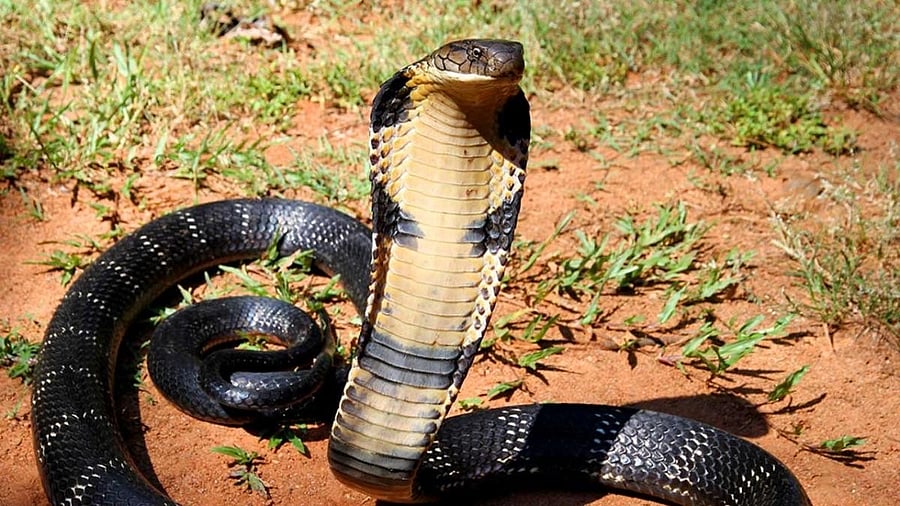
Credit: DH photo
Days after DH’s report on unauthorised commercial activities in the name of research on King Cobras in the eco-sensitive zone (ESZ) of Someshwara wildlife sanctuary in Agumbe, it has now come to light that the forest department’s permission to the two research centres at the centre of the controversy has expired.
This has prompted the department to begin inquiry.
Documents show that the permission for research on King Cobras (Opheophagus hannah) given to P Gowri Shankar of the Kalinga Centre for Research on Ecology (KCRE) expired as far back as 2017, raising questions over the legality of the capture and relocation of snakes.
Similarly, the permission given to Agumbe Rainforest Research Station (ARRS) expired in 2024.
Shankar’s PhD guide Prof Kartik Shankar received
permission to “collect only one specimen”.
Official sources said in the case of ARRS, a recommendation was made to the Union Ministry of Environment, Forests and Climate Change (MoEFF) for renewal of permission, but the same was pending.
In the absence of permission, KCRE has held workshops for more than five years.
One particular programme titled King Cobra bionomics and conservation workshop was “timed to match the breeding season” of the snake.
The dates for 2025 was from March 7 to 9 with the tariff fixed between Rs 10,945 and Rs 15,069 for “early bird” registrations. Held at its Agumbe centre located in the ESZ, the workshop included day and night herping.
Following DH queries by including in them soft copies of the webpages, the KCRE website has been stripped of details regarding tariff and dates. However, DH has copies of the pages.
Besides the lack of permission from the ESZ monitoring committee for its activities, the KCRE workshop showcases “live rescue operation”.
Considering the commercial aspects involved in the workshop and the monetisation of visuals from such “rescues”, the centre’s activities are riddled with conflict of interest besides raising questions about legalities.
Section 12 of the Wildlife Protection Act does permit the chief wildlife warden to grant permission “by an order in writing stating the reasons to kill, capture, snare, trap, drive or bait any wild animal”. However, ever since King Cobra attained Schedule 1 status, such permission will now have to come from the MoEFF. Responding to questions from DH to KCRE, Gowri Shankar told this correspondent that his centre had helped conserve the landscape.
“I bought the land probably in 2008-09 and turned it into a green zone,” he said.
Asked about commercial activities in the ESZ, including resort-like services, Shankar said, running a research centre was a complex operation and required revenue generation. “I have asked my team to remove tariffs,” he said.
On the lack of permission to conduct research, the basis of KCRE’s existence, Shankar said: “Should we shut down an entire organisation till we get permission?”
Kudremukh wildlife division deputy conservator of forests Sivaram Babu M, member secretary of the ESZ monitoring committee, said an inquiry would be conducted.
“We have just concluded our inquiry into the activities at ARRS. As per instructions from the higher-ups, an inquiry will be taken up into KCRE’s activities,” he said.
Shankar refuted allegations that he had captured snakes in the forest. “In almost all rescue operations, we had forest officers nearby. There were cases when foresters couldn’t reach on time. However, officers were present every time we released a snake. I have maintained a document trail of every rescue operation,” he said.
Conservationist Akhilesh Chipli, however, said the question went beyond conflict of interest.
“They are using a charismatic snake to sell a commercial activity to rich people with big cameras. We are surprised at the forest department’s response to this scandal. Forests and wildlife can’t become private properties of a few influential people. Expertise on wildlife doesn’t give ownership,” he said.
